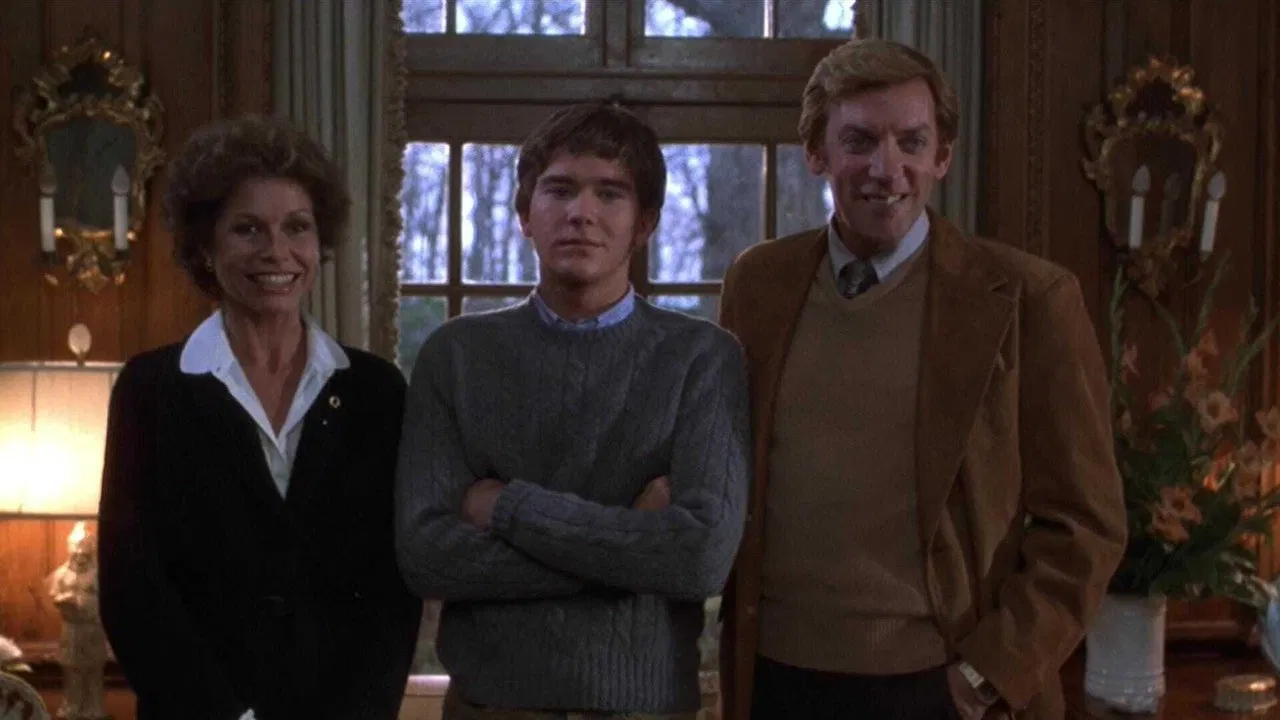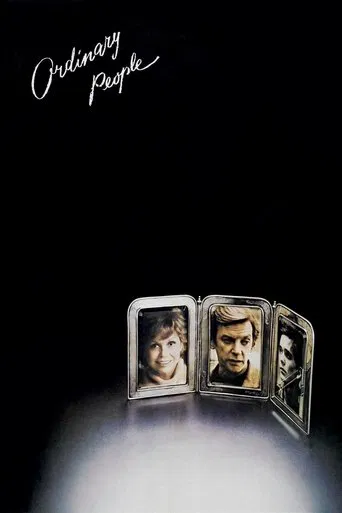

Stylish but barely mediocre overall
... View MoreIt’s fine. It's literally the definition of a fine movie. You’ve seen it before, you know every beat and outcome before the characters even do. Only question is how much escapism you’re looking for.
... View MoreA great movie, one of the best of this year. There was a bit of confusion at one point in the plot, but nothing serious.
... View MoreStrong acting helps the film overcome an uncertain premise and create characters that hold our attention absolutely.
... View MoreVERY few movies deserve the response, It's GREAT. This is one.
... View MoreIn 1980, Robert Redford proved to Hollywood he was more than just a pretty face by directing Ordinary People and winning the Best Director Oscar the following year. Really, though, did anyone think he was just a pretty face? By the time Ordinary People hit the theaters in September 1980, he'd starred in Neil Simon's most successful Broadway play, been nominated for a Best Actor Oscar, won a Golden Globe for Most Promising Newcomer, been nominated for an Emmy, won three Henrietta World Film Favorite Awards, won a BAFTA award for Best Actor, won a Western Heritage Award, been nominated for four Golden Laurels, and created a little contribution to independent cinema called the Sundance Film Festival.In Ordinary People, Donald Sutherland and Mary Tyler Moore are grieving over the death of their favored son. Timothy Hutton, the other son, has spent four months in a mental hospital after an attempted suicide. He's far from well-adjusted when he returns to his dysfunctional family environment, and the film follows everyone's grieving process and how they adjust to their new "normal". This is a very tense family drama, and a groundbreaking film at the time.Moore showed an incredible new side to her acting talents, since this role was so different from her television roles on The Dick Van Dyke Show and The Mary Tyler Moore Show. I've actually never seen her television work, so it's hard for me to imagine her as anything but a serious dramatic actress. If that sounds silly to you, watch this movie and you'll understand. Moore was nominated for Best Actress at the Oscars in 1981, and Hutton, who was only twenty years old, was and is the youngest actor to win Best Supporting Actor. I always say it's incredible to find child actors who are able to give a good, reliable performance, but it's equally incredible to see young adults who are terrific actors. Young children are used to taking orders from grown-ups, but young adults are at the age where they're starting to rebel from authority figures. They're just starting to discover who they are, and attempting to lose themselves in an acting role could feel confusing and unsafe. At the delicate age of twenty, Timothy Hutton gives a deep feeling, unforgettable performance.
... View MoreBased on the 1976 novel of the same name by Judith Guest, this is a beautifully written, acted and directed exploration of the dynamics of a dysfunctional family, grief and depression. It is a deeply moving, intelligent and honest film which Robert Redford, making his directorial debut, handles in a superb manner. The script by Alvin Sargent is wonderful and features the best on screen depiction of depression that I have ever seen.The lead role of Conrad Jarrett is played by Timothy Hutton, who was only 19 at the time. Conrad is struggling with coming to terms with the accidental drowning of his elder brother Buck. As he was present at the time and unable to save him, he is suffering from both PTSD and survivor's guilt which led him to attempt suicide. Understandably, Conrad is in emotional turmoil at the beginning of the film and his experiences make it impossible for him to resume his normal life at home or in school. Many of his problems are compounded by the fact that he has such a poor relationship with his mother Beth, whom he feels does not love him or perhaps even hates him. Hutton is wonderfully natural in the role and Conrad always seems like a real person. In the early parts of the film, he is fidgety, short-tempered, easily distracted, seems unable to focus his thoughts, does not know (at least consciously) exactly why he feels so bad, occasionally says and does things which he immediately regrets and cannot even imagine feeling any better than he does at any given moment. All of these are feelings associated with depression and Hutton perfectly communicates them to the audience. He won a Best Supporting Actor Oscar for his role at only 20 and he is the youngest male to ever win an Oscar. Although he was fourth billed, he is certainly the star of the film and should really have been nominated for Best Actor. However, perhaps this was done deliberately so that he would have a better chance of winning a well-deserved award for his excellent performance.In one of the most inspired examples of casting against type in film history, Mary Tyler Moore plays Conrad's cold, distant, brittle mother Beth. Interestingly, in spite of the fact that her eponymous sitcom was the most successful TV series of the 1970s, she did not appear in a single film in that decade. This was her first big screen appearance since Elvis' last film "Change of Habit" in 1969 and her first worth mentioning since "Thoroughly Modern Millie" in 1967. Beth is a self-obsessed, unfeeling woman who is more concerned about appearances than her surviving son's emotional problems. She focuses all of her attention on maintaining her beautiful home which looks like something out of a magazine in order to create the illusion that the Jarretts are a happy, normal family. This is part of the reason that the casting works so well. Who doesn't love Mary Tyler Moore? Beth keeps Conrad at arm's length and, frankly, seems more than a little contemptuous of him at times. Her well-meaning husband Calvin comes to the conclusion that she may even be incapable of love. Before that, he said that Beth loved Buck but he also said that everyone thought that they had so much in common. If she did love him, I think that it was for the sole reason that he reminded her of herself. It is hinted that Beth may have inherited these characteristics from her own mother, who seems similarly cold.Donald Sutherland, one of the best actors of his generation, is likewise brilliant as Calvin, a good and decent man who tries his best to understand his son and do the right thing. Of the four major cast members, Sutherland was the only one who was not nominated for an Oscar for his performance, which I think he should have been as it is a fantastic performance. Perhaps it was because his character is more straightforward than Conrad and Beth but this is needed to ground the film and contrast their emotional problems with the more well-adjusted Calvin. Judd Hirsch, another veteran of a hugely popular 1970s sitcom, is perfect casting as Conrad's psychiatrist Dr. Tyrone Berger, whose somewhat confrontational style works very well in helping Conrad to heal and forgive himself for being unable to save Buck. He has less screen time compared to the other three main stars but Berger is a hugely important character who helps to hold the film together. Dinah Minoff is excellent in her one scene as Conrad's friend from the hospital Karen Aldrich, who seems cheerful and even tells Conrad to "cheer up" but eventually commits suicide. This sends Conrad into a downward spiral but he is thankfully able to recover. Elizabeth McGovern is very good as Conrad's would-be girlfriend Jeannine who tries her best to understand what he is going through. The same is true of his one-time best friend Joe, played by Fredric Lehne, but Conrad rejects his efforts as being around him reminds him too much of Buck. Adam Baldwin has a great small role as Conrad's confrontational "friend" Stillman who makes no effort to understand his feelings and even deliberately provokes him on one occasion. The great character actors M. Emmet Walsh and James B. Sikking also have nice small roles as Conrad's swimming coach Salan and Calvin's business partner Ray Hanley respectively. Redford has such a great eye for casting.Overall, this is a simply wonderful film which explores the material very respectfully and in an understated manner. After "Citizen Kane", "12 Angry Men" and "The Wicker Man", all of which are in my Top 20, this is the fourth best directorial debut film that I have seen. As it stands, this is probably my 23rd favourite film of all time.
... View MoreIn Illinois, the upper-middle-class family Jarrett is living a trauma in their lives, with the loss of their beloved son Buck followed by the attempt of suicide of his younger brother Conrad (Timothy Hutton). Conrad's father Calvin (Donald Sutherland) is a good man of few words and his mother Beth (Mary Tyler Moore) is a cold-hearted woman that loved Buck and has always been bitter and never supported Conrad, who is under therapy with Dr. Berger (Judd Hirsch). The greatest concern of Beth is to live her perfect life, denying affection to her son. Conrad blames himself for the death of his brother since they were sailing in a bad weather and when one string jammed in the block, he was not able to release it, capsizing the boat. Conrad has difficulties to reestablish his relationship with his friend and quits the swimming team of his school.When Conrad meets Karen (Dinah Manoff), who was interned with him in the same psychiatric clinic also for attempt suicide, he feels better. And when he dates the gorgeous student from the choir Jeannine (Elizabeth McGovern), he begins to see the world with other eyes. But his problem of relationship with his mother associated to the death of Karen, who committed suicide, brings him back to the rock bottom and he runs to meet Dr. Berger. Will the psychiatrist succeed in helping Conrad? "Ordinary People" is a powerful and heartbreaking drama, one of the best American dramas from the 80's. This film is also a milestone in the career of Robert Redford since it is his directorial debut. "Ordinary People" has top-notch direction and performances; the screenplay is very well-written with powerful lines. The timeless story is well-resolved with the realistic decision of the shattered Jarrett family. My vote is eight.Title (Brazil): "Gente Como a Gente" ("People Like Us")
... View More